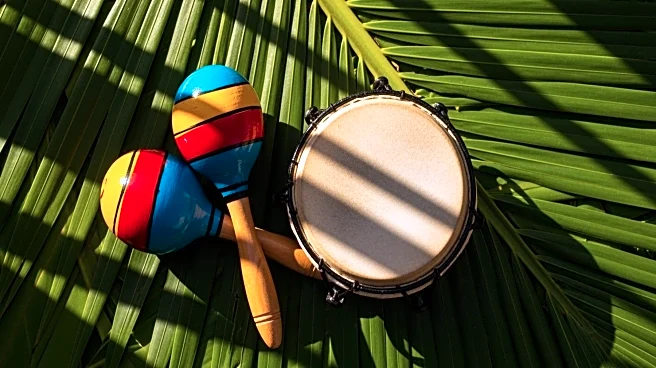What's Happening?
Reparto, a genre born in Cuba's working-class neighborhoods, is gaining traction both locally and internationally. This music style, a fusion of reggaetón, timba, and Afro-Cuban rhythms, has become a cultural
staple in places like Havana and Miami. Despite its popularity, the genre is criticized for its misogynistic lyrics and male-dominated scene. Female artists like Seidy La Niña and Melanie Santiler are challenging these norms, striving for recognition in a field that often marginalizes women's voices. These artists face additional hurdles, such as societal expectations and the need to prove their authenticity in a male-centric industry.
Why It's Important?
The rise of reparto music highlights broader societal issues, such as gender inequality and cultural representation. As the genre gains international attention, it brings Cuban culture to a global audience, potentially influencing perceptions of Cuban identity. However, the genre's misogynistic undertones pose challenges for female artists seeking to break into the scene. The success of women like Seidy La Niña and Melanie Santiler could inspire more inclusive practices within the music industry, promoting gender equality and diverse representation. This shift could also impact how Cuban culture is perceived and consumed worldwide.
What's Next?
As reparto continues to grow, there is potential for the genre to evolve, particularly in its treatment of women. Artists like Ozunaje suggest that for reparto to reach larger audiences, it must adapt its language and themes to be more inclusive and less offensive. This evolution could open doors for more female artists and diversify the genre's appeal. Additionally, as the genre gains popularity, it may influence other music styles and cultural expressions, further integrating Cuban culture into the global music scene.
Beyond the Headlines
The challenges faced by female artists in the reparto scene reflect broader societal issues of gender inequality and cultural representation. The genre's evolution could serve as a microcosm for larger cultural shifts, promoting more inclusive and diverse narratives in music and beyond. This change could also influence how Cuban culture is perceived globally, potentially reshaping cultural stereotypes and fostering a more nuanced understanding of Cuban identity.









